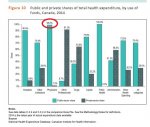- Joined
- Jun 18, 2013
- Messages
- 46,137
- Reaction score
- 14,558
- Gender
- Undisclosed
- Political Leaning
- Conservative
\We spend 3.5 trillion in healthcare and 25% of healthcare costs are administrative, you can look it up easily. Not quite 1 trillion, but it will pass 1.5 trillion in the next few years because healthcare costs are projected to rise to nearly 6 trillion by 2027.
I actually work as a software developer for a company that tries to simplify complexity for insurance companies. Software is already heavily used by the healthcare industry but there is no sign of a decline in administrative costs. People often believe software is the magic bullet to simplify everything, but software can only automate some things and often causes costs of its own, needs to be expensively revised when processes change, which they always do, and the complexity management software does encourages people to add more complexity on top of that. Also, even if software does save on costs, because healthcare is so bad at reducing prices, companies are likely to add that to their profit margins, or their executive pay, or doctor pay, etc. Remember that the executive pay, profit margins, legal costs, and software costs are already part of the administrative costs for healthcare providers, insurance companies, drug companies and middlemen and are unlikely to be reduced by software.
In an ideal world software is the magic bullet to reduce administrative costs, in the real world it only manages complexity very expensively and allows people to heap more complexity on. We are going to have to simplify our systems themselves and make them more cost effective, rather than relying completely on software to manage all the crazy complexity and hope it doesn't matter anymore.
Yep... I remember when all the rage to reduce medical costs was forcing the healthcare industry to "adopt electronic medical records"
Oh boy that was supposed to save billions. Pooh... at the time.. hardly anyone was NOT using electronic medical records. Problem was. government... state.. federal..and their insurances.. etc.. REQUIRED hard copy charts. Want to get a patient approved for surgery... you are FAXING.. hard records to the Medicaid representative.
Want to pre authorize VA? Again.. faxing the hard copies of the chart. And so on.


